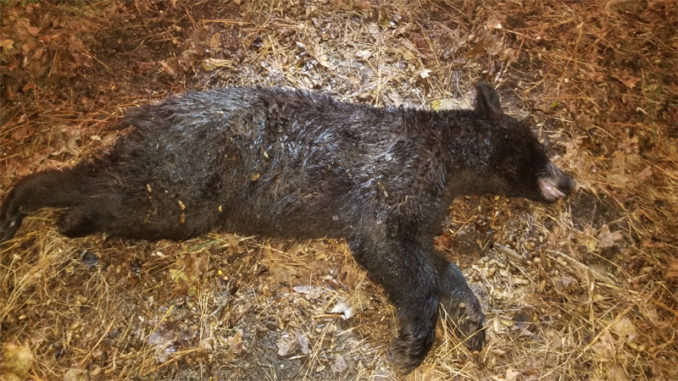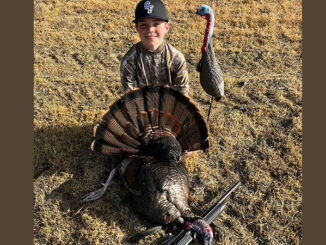
Hunting guide receives rabies vaccination
A black bear found dead in Hyde County has tested positive for rabies. Johnnie Dale, a hunting guide and operator of Buffalo Creek Guide Service, had to undergo immunization and antibiotic treatments after handling the bear one day before its death. Dale first found the black bear on Sunday, Dec. 16, 2018.
“I was filling feeders with corn and peanuts and he was lying beside one of them. He weighed 85 to 90 pounds and was alive but non-responsive — no leg, mouth, or other movements. I could not move him Sunday because he was not tagged, which would have been illegal. I checked him again at 7 p.m. He was breathing and moving his eyes, but otherwise wasn’t moving. I pulled out his tongue to check his throat and checked for diarrhea, but could not find anything wrong with him,” said Dale.
The next day, the bear was dead, and Dale called NCWRC Bear and Furbearer Biologist Colleen Olfenbuttel. Biologist Kimberley McCargo met Dale and transported the bear’s body to the Commission’s Denton office where Chris Turner, another NCWRC biologist, performed a necropsy.
Testing confirms rabies
Turner sent samples to the Southeastern Cooperative Wildlife Disease Study at the University of Georgia on Dec. 19. Two days later, the SCWDS notified the NCWRC and other officials that the bear had rabies.
“Rarely is a black bear’s death disease-related,” Olfenbuttel said. “Maryland had a positive rabies test in a black bear in 2007, and Maryland had one in 2012. New York reported two positives in 1999 and 2003.”
Dale told an official with the Hyde County Health Dept. that he had placed his hand in the bear’s mouth without gloves, and she advised him to go to a hospital immediately because it had been about five days since he handled the bear. Rabies immunizations are only effective if started within five days of exposure.
Although Dale had no symptoms, they aren’t usually apparent until a week to a month after exposure. And once symptoms show, rabies is nearly 100 percent fatal.
It was 11 p.m. on a Saturday, and when Dale called Wake Medical, they said he would have to wait until the following day to start treatment, but when the lady from the health department told him it was urgent that he get a shot that night, he drove to Johnson Memorial Hospital. They took blood samples from Dale, gave him antibiotics, and gave him his first round of shots.
“I had five shots — rabies vaccine in the arm, two antibiotic injections in the hip, and two in my butt. I would have to go back in a week for a rabies vaccine booster and two weeks later for another booster,” said Dale.
Hunter may have killed another rabid bear months ago
Over the summer, Dale found eight dead raccoons, and one of his game cameras showed the rabid bear with raccoons at a feeding trough. A different camera captured the bear fighting with another black bear.
“I killed the other bear a couple of days later and put its head and meat in the freezer. I will have that bear tested for rabies. The bear had been trying to break into my camp. He chewed up tires and his paw prints were all over a camper door. He would come to the barn at night, grab deer guts, and run off with them,” he said.
Olfenbuttel said they don’t know how the bear got rabies, and warned against handling dead animals with bare hands.
“We don’t know how the bear was infected. It had scratches on its nose, so it could have been bitten by a rabid raccoon. It could have contracted rabies through eating corn covered with saliva from a raccoon with rabies, which is less likely.
“Johnnie opened the bear’s mouth with his bare hands and had cuts on his hands. The normal mode of transmission is through a bite or open wound. You should never handle a dead animal with bare hands and you should wash your hands after field dressing any animal. The most important thing is to notify us if you find a dead or dying black bear, no matter the cause,” she said.
To report an unhealthy or dead bear, call the Wildlife Helpline, (866) 318-2401 weekdays, (800) 662-7137 weekends.


